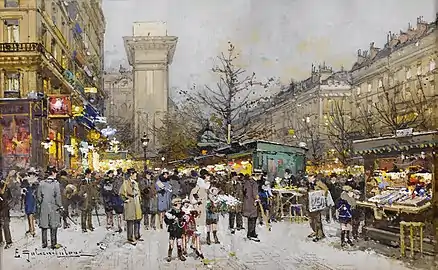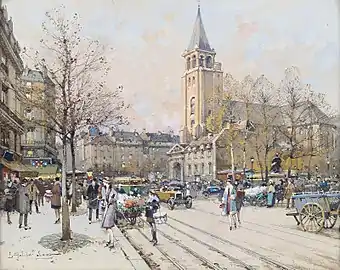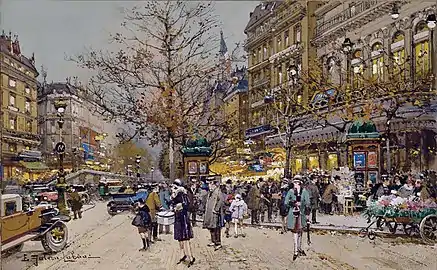Eugène Galien-Laloue
Eugène Galien-Laloue (1854–1941) was a French artist of French-Italian parents and was born in Paris on December 11, 1854. He was a populariser of street scenes, usually painted in autumn or winter.
Eugène Galien-Laloue | |
|---|---|
 Eugène Galien-Laloue (1854-1941) | |
| Nationality | French |
| Known for | Painting |
Notable work | En Normandie, 1876 Bords de la Meuse, 1889 |
| Movement | Impressionism |
Biography
His paintings of the early 1900s accurately represent the era in which he lived: a happy, bustling Paris, la Belle Époque, with horse-drawn carriages, trolley cars and its first omnibuses. Galien-Laloue's works are valued not only for their contribution to 20th-century art, but for the actual history, which they document. His work can be seen at the Musée des Beaux-Arts, Louvier; Musée des Beaux-Arts, La Rochelle; Mulhouse, France.
A typical Galien-Laloue painting depicts sidewalks and avenues crowded with people or tourists mingling before the capital's monuments. He also painted the landscapes of Normandy and Seine-et-Marne, as well as military scenes he was commissioned to produce in 1914. The Republic of France selected Galien-Laloue to work as a 'war artist,' both during the Franco-Prussian War and World War I, chiefly in watercolor.
Galien-Laloue was in exclusive contract with one gallery and used other names: "L.Dupuy", "Juliany", "E.Galiany", "Lievin", "G.L" "Dumoutier" and "P.Mattig".
Gallery
 Paris Porte Saint-Denis
Paris Porte Saint-Denis Paris Eglise de St-Germain-des-Prés
Paris Eglise de St-Germain-des-Prés Paris Boulevard Bonne Nouvelle
Paris Boulevard Bonne Nouvelle Quai du Louvre (watercolour)
Quai du Louvre (watercolour)
References
External links
| Wikimedia Commons has media related to Eugène Galien-Laloue. |